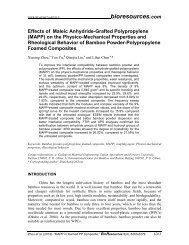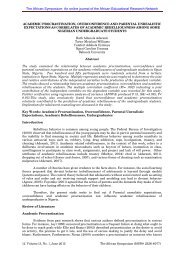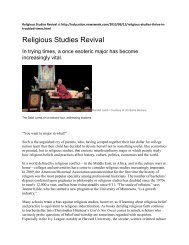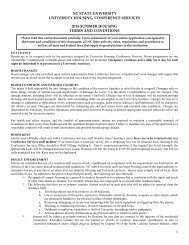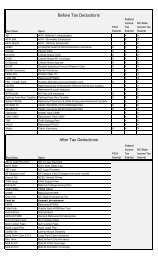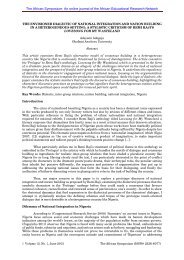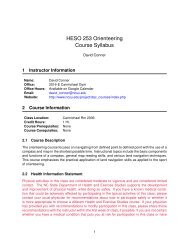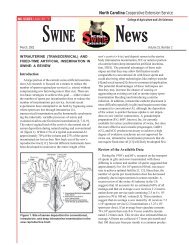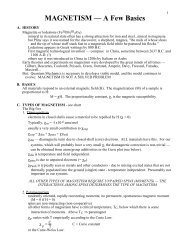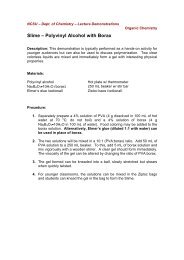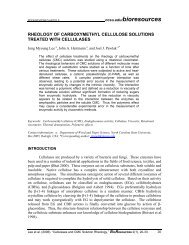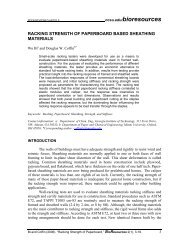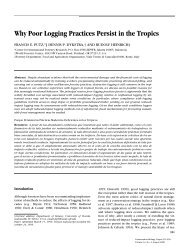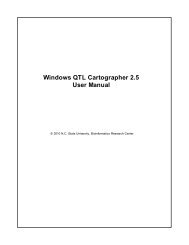Dictators, Songwriters, and the Negotiation of Censorship
Dictators, Songwriters, and the Negotiation of Censorship
Dictators, Songwriters, and the Negotiation of Censorship
Create successful ePaper yourself
Turn your PDF publications into a flip-book with our unique Google optimized e-Paper software.
Wilson<br />
tu muerte, justo a la madrugada / en manos de la misma sociedad” (ll. 19-<br />
22). Such a clear call for retribution at <strong>the</strong> h<strong>and</strong>s <strong>of</strong> <strong>the</strong> populace would<br />
immediately bring down <strong>of</strong>ficial condemnation upon <strong>the</strong> b<strong>and</strong>.<br />
“Juan Represión” is an example <strong>of</strong> <strong>the</strong> clear language that failed to<br />
break through <strong>the</strong> censors’ monopoly on public discourse. The open<br />
reference to <strong>the</strong> army in <strong>the</strong> first song discussed, “Botas locas”, fails<br />
similarly, as it was far too direct <strong>and</strong> clear in its message, <strong>and</strong> <strong>the</strong> song was<br />
simply cut. It is astounding to note, for example, that in that song, <strong>the</strong><br />
singers go so far as to refer vaguely to armed resistance to <strong>the</strong> government.<br />
Describing <strong>the</strong> obligatory military service, <strong>the</strong> lyric voice opines that<br />
perhaps <strong>the</strong> generals should feel a little nervous about putting guns in <strong>the</strong><br />
h<strong>and</strong>s <strong>of</strong> <strong>the</strong> masses: “porque a usar las armas / bien nos enseñaron / y<br />
creo que eso / es lo delicado / piénselo un momento señor general / porque<br />
yo que usted me sentiría muy mal” (ll. 37-42). O<strong>the</strong>r songs about <strong>the</strong><br />
regime, however, were shifted into a more suggestive poetic discourse, <strong>and</strong><br />
<strong>the</strong>refore escaped detection. Originally, two o<strong>the</strong>r songs also referenced <strong>the</strong><br />
military government, but were changed in <strong>the</strong> revision process. Slight<br />
alterations were made in both songs, <strong>the</strong> net effect <strong>of</strong> which was that in<br />
each case <strong>the</strong> focus <strong>of</strong> <strong>the</strong> song was shifted away from <strong>the</strong> military<br />
government, instead—apparently—targeting some o<strong>the</strong>r aspect <strong>of</strong> society.<br />
But at <strong>the</strong> same time that <strong>the</strong> lyrics were re-centered, <strong>the</strong>y were made more<br />
ambiguous. Clear references were obfuscated, <strong>and</strong> direct language made<br />
more lyric. The result in both cases is a very suggestive text that still retains<br />
a subtext <strong>of</strong> repression.<br />
One example is seen in <strong>the</strong> first song <strong>of</strong> <strong>the</strong> collection; titled<br />
“Instituciones”, it serves as <strong>the</strong> introduction to <strong>the</strong> concept album.<br />
Reference is made only obliquely to those in power; for example, as those<br />
who manipulate us. “Los magos, los acróbatas, los clowns / mueven los<br />
hilos con habilidad” (ll. 9-10). The most overt reference to <strong>the</strong> power <strong>of</strong> <strong>the</strong><br />
military government before censorship in this fairly indirect song was still<br />
subtle: “[o]ye hijo las cosas están de este modo / dame el poder y deja que<br />
yo arregle todo / ¡no preguntes más!” (ll. 32-34). Yet <strong>the</strong> reference was<br />
64



